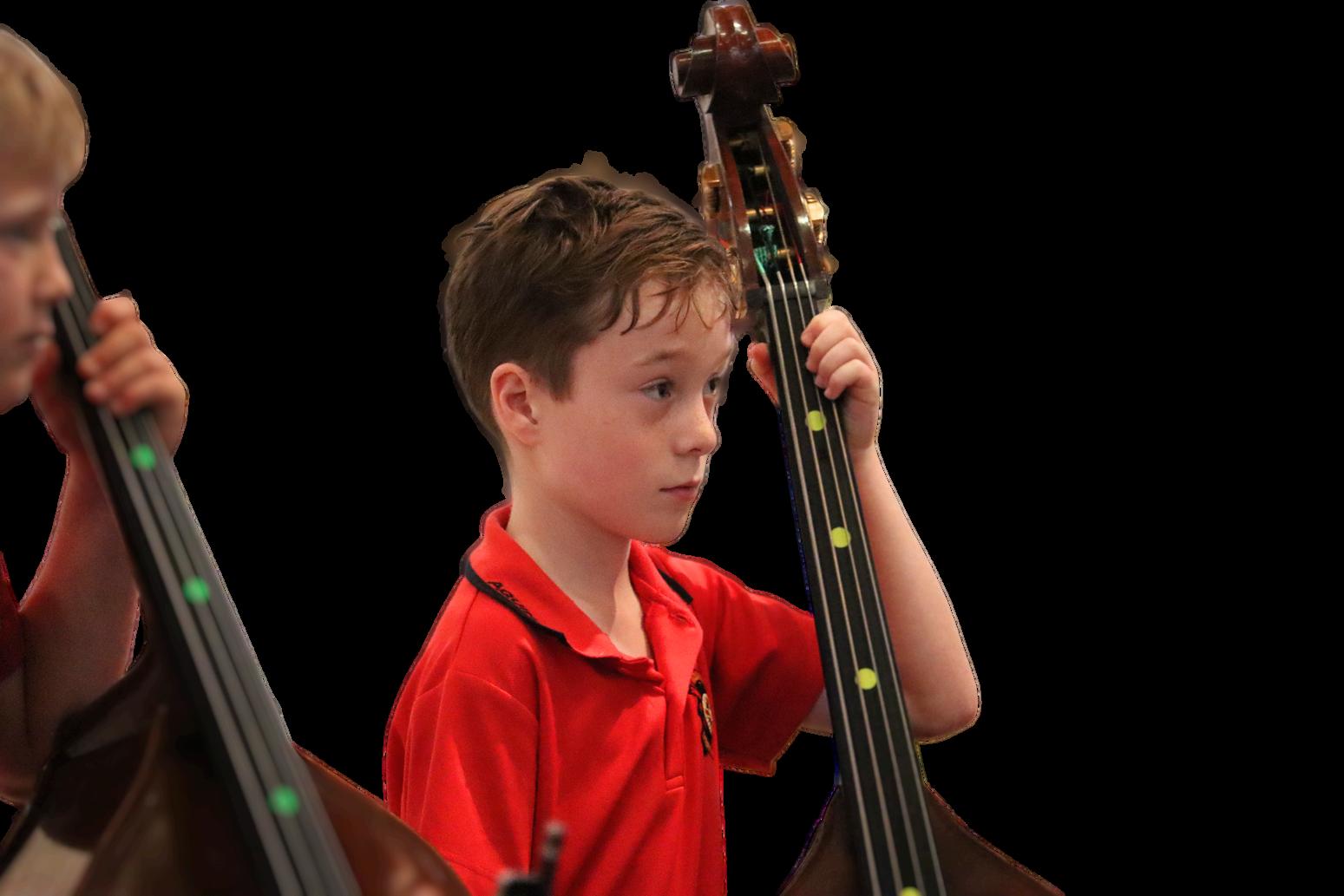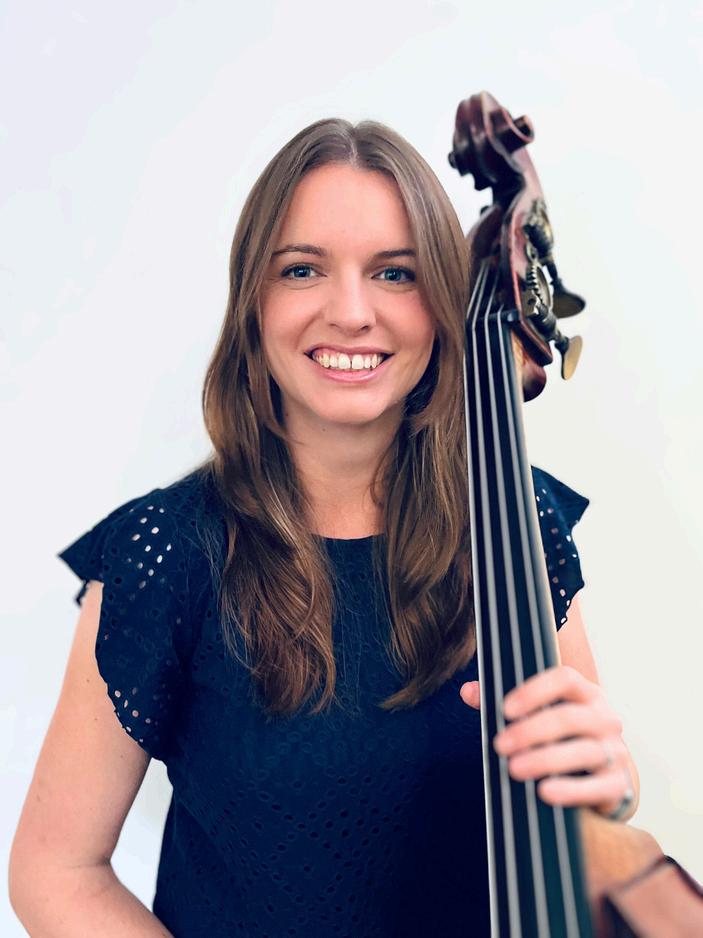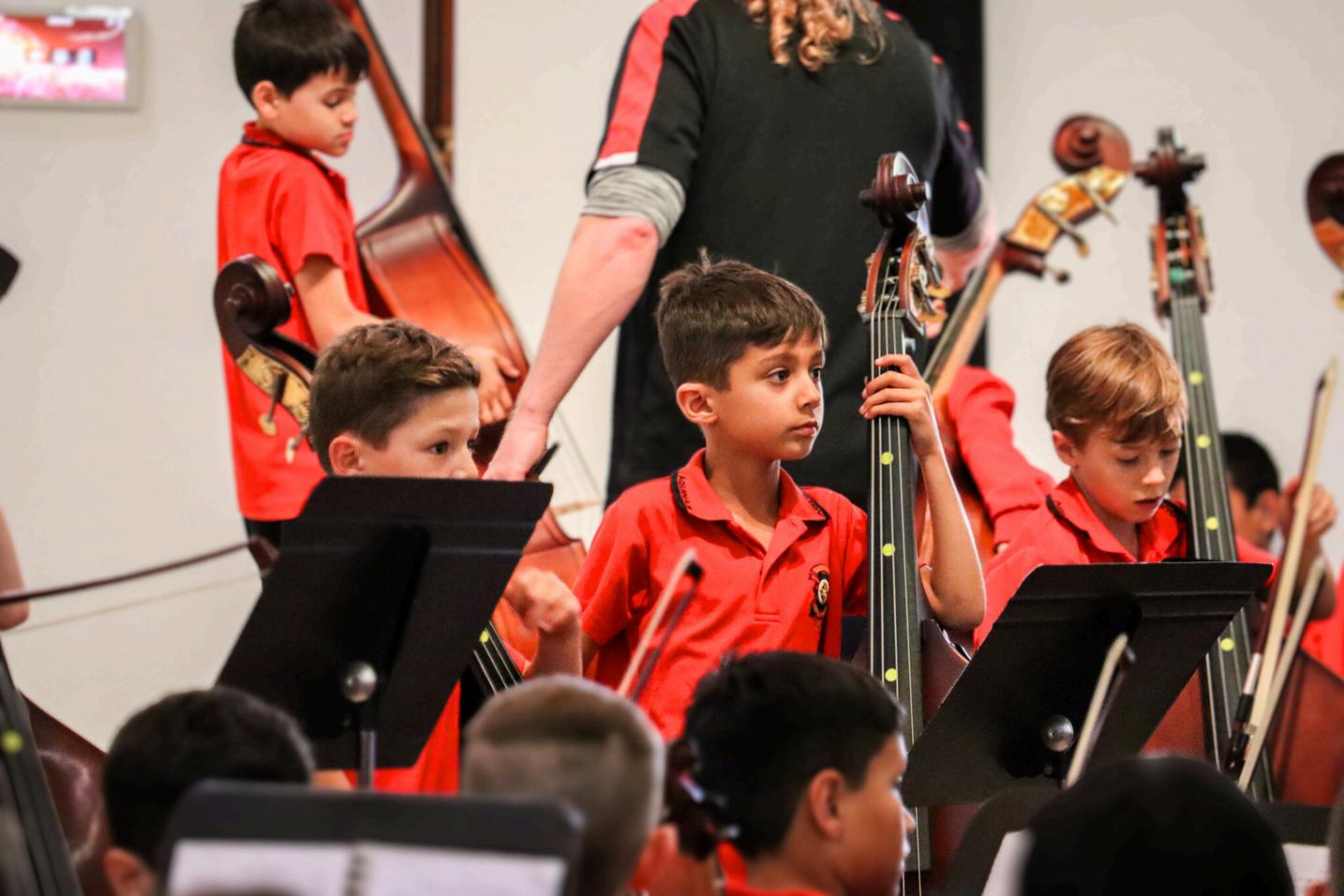
















The major benefits of teaching music are widely understood by educational experts There is an abundance of academic literature highlighting the cognitive development, socialisation, as well as intrinsic and extrinsic benefits and achievements of students when undertaking instrumental music lessons
Decades of research clearly shows that learning a musical instrument at an early age, can help to develop students’ abilities in all aspects of their learning such as: Contributing strongly to personal intelligences by the development of emotional and social skills through group singing, dancing playing and creating; Enhancing social skills and self-esteem; • Developing physical skills;
“The things that promote literacy and numeracy are the arts, beginning with serious arts education in the early years.



If we want a creative nation, an imaginative nation, a thinking nation and a nation of individuals, then we must increase the time for arts education, especially music education ”
Richard Gill
Learning a musical instrument at Aquinas College will support and educate each individual student intellectually, physically, socially, and emotionally through creative and active music-making In addition, the program will aid in further developing students’ numeracy, literacy and fine motor skills
All Year Two and Three students will participate in the program for three academic terms, after which the college will offer students the opportunity to continue or withdraw from the program Lessons, instrument hire, music practice diaries and method books are provided free of charge Students can choose to continue with the same instrument into the Year Three and Four Programs, and those students who continue into year five, parents will then fund their child’s participation in the instrumental music program
In addition to lessons, students will experience being part of an ensemble The Year Two and Three String Orchestra will commence in Term Two, once students have learnt a sufficient number of notes The orchestra will rehearse for one hour per week during the school day
Instrumental teachers participate in the orchestra rehearsal to model effective ensemble practices and etiquette to students Performance opportunities as part of the orchestra, small ensemble, or as a solo performer, expose students to a number of positive mind sets that channel into other aspects of school life
These include:
Self-confidence and presentation skills
Problem solving, perseverance and resilience
Empathy and compassion
Social skills and a sense of teamwork
Academic research conducted in both Australia and internationally clearly suggests that similar programs have been implemented with enormous success for a number of years in many schools It is crucial that Aquinas College is able to provide students with a holistic education



Brian Kruger is a violinist and pianist with extensive performance, composition and teaching experience
Having been a concertmaster and soloist for the Perth Symphony Orchestra and Australian Baroque, he is also known for his feature film and rap music composition portfolio, having been granted the Martin Simms and Western Australian Music Industry awards among others in these fields



the Royal Northern College of Music, Manchester, in 2007 She continued her studies with Jiri Hudec, Principal Double Bass of the Czech Philharmonic Orchestra and completed a Postgraduate Diploma in Performance with Distinction in 2008

In the UK she began her playing with the National Children's Orchestra of Scotland at the age of 10 then performed throughout Europe with the National Youth Orchestra of Scotland including playing at the BBC Proms in the Royal Albert Hall, London
During her studies she played with orchestras including Britten-Peers Symphony Orchestra and the Halle
Kirsty moved to Perth in 2008 where she lives with her husband and three children In Perth she regularly plays as a freelance double bassist with orchestras such as the Perth Symphony Orchestra, WA philharmonic and enjoys playing in smaller chamber groups performing music from Tango and contemporary to classical
She has tutored at the Perth Summer Orchestra Camp and the West Australian Youth Orchestra in which many of her students play. Kirsty loves teaching and sharing the joy of playing the double bass with her students
Having learnt piano from the age of five and cello from the age of ten, Amber's participation in chamber groups and orchestras at school, as well as being a member of the WA Youth Orchestra for many years, developed her love for performing and lead her to pursue a career in music
After graduating from Penrhos College, Amber completed a Bachelor of Music Performance at UWA before relocating to London to undertake postgraduate studies in both modern and baroque cello at the Royal College of Music
Throughout her career, Amber has worked extensively as a freelance musician both locally and overseas as a member of various chamber groups and orchestras for public performances in a wide range of genres, as well as organising and performing in small ensembles for private and corporate functions and events
She is currently looking forward to performing in the orchestra Since returning from the UK in 2007,
Am

privately and at a number of private schools around Perth
The enjoys seeing students’ progress and grow and confidence as they work towards achieving their various goals Amber has been a part of the string programs at Trinity College (2007-2015) and St Hilda’s Anglican School for Girls (since 2007), and was welcomed to the string program at Aquinas College in 2018



( )( ) University of Adelaide and afterwards received a Churchill Fellowship to study at the Guildhall School of Music and Drama in London.
She has played full time in WASO for over 20 years in both violin sections and been Principal Second violin in their Education Chamber Orchestra for several years
Jane taught at Penrhos College for 6 years, where she also directed their Senior String Orchestra and Junior String Orchestra and various small string ensembles She conducted the Penrhos String Ensemble in the Washington International Music Festival, where they were awarded Gold in a performance with the Penrhos Chorale during a tour of the USA

All students will be learning as part of a group.
Lessons are 30 minutes and take place every Friday on a fixed timetable This means students will be coming out of class at the same time each week This allows the classroom teacher to plan their Friday teaching around the students who are absent from their classes at regular times each week and results in a more productive use of classroom, despite the interruptions
In the case of excursions, incursions, whole school assemblies or sport events, lessons will either be postponed until the following week or the lesson timetable will run to a modified schedule which will be emailed to classroom and instrumental teachers only
You will see an outline of the lesson schedule below Students are only required to bring their instrument to school on the weeks that a lesson is scheduled All instruments must return home on Friday afternoon
During Term One violins, violas and cellos will be stored in classrooms under the guidance of the classroom teacher Double basses will need to be stored in the Music Room from the start of the day through to 3pm Double basses are not to be stored in the Year Two and Three classrooms
It is our intention to provide a number of spare double basses which remain at the school and will alleviate the need to bring these instruments to and from school each week It must be noted however, that there may not be enough spare basses for each boy to use in orchestra so they will need to share during these times Parents will be contacted if double basses need to be brought to school on a roster system
WEEK 1 No Instrumental Music lessons
WEEK 2
WEEK 3
WEEK 4
WEEK 5
WEEK 6
WEEK 7
WEEK 8
WEEK 9
WEEK 10
Music Lesson 1 Yr 2 Lessons & Orchestra
Music Lesson 2 Yr 2 and 3 Orchestra
No Lesson (EXEAT)
Music Lesson 3
Year 2 and 3 Orchestra
Music Lesson 4 Year 2 and 3 Orchestra
Music Lesson 5 Year 2 and 3 Orchestra
Music Lesson 6 Year 2 and 3 Orchestra
Music Lesson 7 Year 2 and 3 Orchestra
No Lesson No Orchestra
Parents are very welcome to attend lessons to see how their child is progressing on their instrument, particularly if you have developed an interest in the instrument yourself and are looking for ways to assist your child’s learning at home
Apart from bringing their instrument to each lesson (which also includes bow, bow rosin, and shoulder rest for violin and viola) students are also required to bring/provide the following:
A pencil
Display file (for practise copies of orchestra pieces or other additional music). Please label.
Method book
A smile and positive attitude for learning!
In most cases, these items do not fit inside the instrument cases The Uniform Shop sell Music satchels, much like the Library satchels, otherwise a plastic case big enough to hold the above items will also help to protect books and stay organised
All students will be using instruments hired from WA Music and Musicorp All students will have an instrument allocated to them based on the sizing recorded at the Orientation Day.
Each instrument has a serial number, located on the side of the finger board, down by the belly These serial numbers will be recorded against your son’s name in a database as well as written in the front of their music diary In some cases, students will need to be given a larger instrument as they are growing boys This will be left to the discretion of the instrumental music teacher
In general, all instruments need to be handled with the upmost care String instruments are particularly fragile as they are acoustic instruments and they naturally expand and contract based on conditions
There are parts that should not be touched or knocked and these include the tuning pegs, fine tuners and bridge It is best not to try and tune your son’s instrument (using the tuning pegs or fine tuners) unless you have had some string training A lot of the time this results in snapped strings
The bridge holds the strings in place and is not permanently attached to the body If knocked, it will come out of place very easily and this in turn will affect the strings
Over tightening the strings can also collapse the bridge, which is another reason not to attempt tuning at home Violins and violas come in hard cases, whereas cellos and double basses have soft fabric cases

At no time should these instruments be placed on their bridges, in or out of the case. Cellos and double basses are best stored on their sides, and when travelling in a vehicle let common sense prevail

The bow requires equal care and should always be kept in its case when not in use As shown by the instrumental teacher, the hairs on the bow are pulled/pushed across the strings to produce sound
There are some important things to remember about the bow:

1 The screw loosens and tightens the hairs on the bow
2 Hairs should be loosened when stored in the case
3 Hairs should be tightened when used to perform
4 Over tightening will break the strands of hair There stick should still appear bowed otherwise the hairs are too tight
5 Hairs should never be touched as your hands carry oils and dirt that will dirty the hairs and cause damage
6 Hairs will sometimes break off on their own accord When this happens, it is better to cut the hair off with scissors rather than pulling the loose hair off with a ripping motion
Loss of instrument or damages
In the event that your son’s instrument results in minor damage that cannot be repaired by an instrumental teacher, it will be returned to our supplier for repair
Therefore diligent care must be taken at all times when handling, transporting or storing the instrument It is in your son’s best interest that he has an instrument for orchestra and lessons, otherwise it can be quite disruptive to his learning and progression
In accordance with the loan agreement with WA Music, damage that renders the instrument or its parts non- playable or loss of the instrument or its parts, such as the bow or shoulder rest, the college will incur a fee which will be passed onto parents. In the event of theft, the College must be notified immediately and a Police Report number will be required


The Year Two/Three String Program Loan Agreement outlines the expectations and responsibilities of parents if such incidents occur This online document needs to be completed and then submitted electronically to the College by Week Five, Term One.
Your teacher will be specific as to the duration and regularity with which home practice should be taking place. To put it general terms, home practice is like training with a sporting team or studying for a test, the best results occur over short but regular practice sessions
The idea of practice is not to work on the things we can already do, but to work on the sections that are challenging and extra require work Playing pieces for fun is always encouraged, but always allow time to work on techniques and passages which need attention, as directed by the teacher Playing for family members should be encouraged as it improves confidence and performance presentation.
Short practice sessions multiple times during the week is better than practicing for one hour the day before your next lesson Obviously, you and your child will need to agree to a practice schedule that works with your day to day family schedule, and this can relieve some of the pressure parents and students feel when trying to fit another activity/commitment into an already busy schedule
Students will all be learning from one or more of the following method books:
‘Vamoosh’ violin or viola book 1 by Thomas Gregory
Backing tracks are available online using the link: Vamoosh String 1 Backing Tracks.zip
“Strings in Step for Cello” by Jan Dobbins. Backing tracks are available online using the following link: https://global.oup.com/booksites/content/9780193221383/audio/
This is a good tool to use when learning to play in time with accurate rhythm Backing tracks can be played directly from the website or downloaded as mp3 files with which you can create a playlist on a device
“Strictly Strings” Bass Book 1 by J. Dillon, J. Kjelland and J. O’Reilly.
Please provide a space for productive practice in your home and we advise that siblings (younger or older) should not have any contact with your son’s instrument, as it can potentially result in damage to the instrument Students need to remain seated or standing in one place when playing their instrument









“I’ve really enjoyed playing and Violin, learning new songs and getting to play music with my friends. I’ve loved being a part of String Orchestra because I get to hear all the different String instruments playing together - and it sounds great”
Ronald Tyler
“I’ve loved learning Double Bass Learning different notes and chords as well as getting to socialise and meet new people in Orchestra has been fantastic I’ve especially enjoyed learning the piece easy streets because it is a very fun piece My teacher is very kind and nice and has helped me to learn the instrument. I will be continuing playing double bass next year. Thank-You Mr Montgomery for helping me with my Double Bass lessons”
Robert Ponferrada
“I’ve enjoyed playing the Double Bass because the sound we make with the Cellos, Violins and Violas is amazing. The harmonics are relaxing and makes you sleepy! One thing I’ve learnt is no matter how many times you make a mistake the other parts of Orchestra back you up”.
Oliver Johnson
“I’ve enjoyed learning Cello. Playing Twinkle Twinkle is fun and now I can remember the whole piece. I wouldn’t have done it without Mrs Day - she is a fantastic Cello teacher. I will be continuing Cello next year. Music has been fun in Year 3!”
“I have enjoyed playing the violin because the sound of everyone playing it together is very satisfying I have been learning easy streets which is my favourite song because it’s the shortest and the best”
Harrison Osbrough
Brian Kruger Violin 9450 0654 brian.kruger@aquinas.wa.edu.au Jane Johnston Viola 9450 0654 jane.johnston@aquinas.wa.edu.au Amber Day Cello 9450 0654 Amber.Day@aquinas.wa.edu.au
Kirsty Collins Double Bass
9450 0654 kirsty.collins@aquinas.wa.edu.au
William Chan 11


